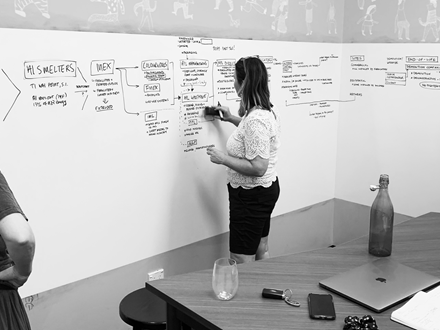It is Aotearoa New Zealand's first business to measure the circularity of products, material flows and business operations. Profile Group works alongside circular design and innovation partner Circularity, using the Circular Transitions Indicator tool to continually improve impact.
Profile Group is a family of businesses situated at the heart of Waikato. It represents Aotearoa New Zealand’s largest integrated aluminium supply chain for window and door solutions. If you haven’t heard of the company before, you may be familiar with its products, which have contributed to over 50% of New Zealand's architecture. They include APL Window Solutions and a network of over 70+ fabricators nationwide, better known by the product brands of Vantage, Altherm, and First Windows & Doors. This is a group of people and businesses that have never done things by halves. Every aspect of their 50+ year strategy is made with consideration of ecology restoration, energy efficiency, material usage and long-term impact.
The work Profile Group is doing to transform packaging systems is just one step in its journey towards a circular economy for NZ manufacturing. This journey began by forming a roadmap with Circularity and undertaking a waste audit to better understand the impacts of packaging and materials used to date. This uncovered the reality of just how much single-use plastic wrap was being used each year to protect products in transit – enough to cover 25 percent of the Earth’s circumference. Alarmingly, this level of packaging is most likely the norm across the manufacturing industry and many others.
The solution
Profile Group worked with Circularity to develop a packaging alternative that uses circular principles to radically reduce waste and eliminate harmful materials. By engaging collaboratively with staff, partners and stakeholders in the Waikato region, they were able to transform their systems in a number of ways. This included the design of a completely regenerative, reusable, renewable and eventually compostable ‘packaging service’ called Wool Looped. It is made locally from an underutilised stream of New Zealand wool. It is created for multiple uses, with a system that supports at least 12 cycles before being returned for remaking. And it’s designed to lead the way, as one of NZ's first closed loops for materials in construction.
In order to operate within a truly closed loop system and retrieve packaging after windows and doors have safely made it to their destination, Profile Group has developed a reverse logistics system with the help of its distribution company APL Direct. Trucks returning to the depot from around the country, formerly empty, now carry Wool Looped packaging back to the Hautapu depot for reuse multiple times before the product is eventually either remade back into new packaging, or composted at Maungatautari Sanctuary.
In order to understand how the company was improving its levels of circularity, Profile Group worked with Circularity to become the first organisation in Aotearoa New Zealand to comprehensively measure and validate the circularity of its material flows, products, packaging, energy and water use, using the Circular Transition Indicator Tool (CTI), created by the World Business Council for Sustainable Development). The tool and applied insights provide Profile Group with a powerful way of engaging and securing buy-in from its stakeholders to go circular.
Benefits
By putting the Wool Looped solution in place alongside other circular systems, Profile Group is improving its CTI circularity score for packaging from 64% to 90%. By reducing reliance on single-use materials, there is a potential saving of more than $500,000 per year on waste disposal costs. The teams and businesses of Profile Group view the long-term benefits as going far beyond their own supply chain and network of businesses. They plan to share their learnings and progress openly. They hope to inspire the entire manufacturing industry to develop and adopt circular economy solutions for packaging, as well as other waste streams, energy flows and material inputs.
You can stay connected to their progress, and understand more of their targets and initiatives via the Profile Group website.

